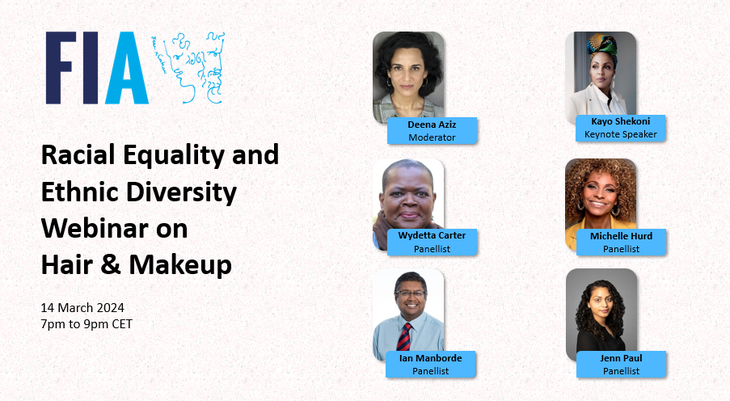As part of its deep and ongoing commitment to promoting diversity and inclusion, FIA undertook in 2020 to organise a series of webinars focusing on racial equality and ethnic diversity and how they impact the working lives of performers. Aiming to challenge discrimination and bias based on appearance and the limited opportunities that may result from it, the webinars are an opportunity to bring our global membership together to share experiences and best practices on how to make our industry and unions more diverse and representative of our societies. Discussions aimed to highlight how discrimination may prevent equal access to jobs or to protective contracts. They also aimed to unpick how racist bias can impact the writing of characters and scripts, with direct consequences for performers. In particular, they aimed to highlight the actions and the strategies that unions are developing in this area.
The second webinar of this series took place on on February 23, 2022. David White, former National Executive Director of SAG-AFTRA, moderated the webinar, together with Katja Holm, senior consultant for SAG-AFTRA and co-convenor of FIA’s Global Diversity Group. Four FIA affiliates were invited to share their initiatives in this area, as well as the main obstacles they face, namely: SAGA (South Africa), SFA (France), ACTRA (Canada) and Actors’ Equity Association (United States).
Lisa Michelle Cornelius, Executive Vice President of ACTRA Toronto began by introducing ACTRA’s regional and national “Diversity, Equity, Inclusion and Belonging” committees, which address sectoral challenges around gender and race. She presented several practical actions agreed in collective agreements negotiated with producers who, for example, agreed to increase their efforts to recruit more women, people with disabilities and BIPOC performers as stunt actors, when unidentified in a scene. ACTRA has also encouraged producers to recognise discriminatory practices regarding on-set hair and make-up services that are often lacking or inappropriate for people of colour and has co-signed a bulletin on the topic.
Jack Devnarain, Chairman of the South African Guild of Actors (SAGA) recalled the blatant lack of representation of people of colour on screen in South Africa, as a result of the Apartheid regime. This was then addressed during the reconciliation process by setting quotas, however Jack Devnarain highlighted the limitations of this approach. He outlined how the cultural and language diversity within racial groups has been undermined by such quotas and their application would mean certain shows would lack white, coloured and Indian representation. SAGA has therefore taken the position of supporting equal opportunities for roles and the fight against the exploitation of performers rather than encouraging quotas.
Nathalie Duong, actress, singer and active member of Syndicat Français des Artistes-Interprètes (SFA), explored the French perspective on anti-discrimination. She explained that ethnic statistics and quotas are forbidden by French law for protective reasons and she questioned the relevance of ethnic categories that fail to meaningfully capture people of diverse racial backgrounds. Nevertheless, she recognised the importance of having information about patterns of discrimination to combat racism. She also argued for the possibility for any actor to play any role. She stressed that the SFA opposes all types of discrimination and has led legal and advocacy battles in specific cases of racism faced by artists.
The final panellist was Kate Shindle, President of the American Actors’ Equity Association (AEA). Contextualising the conversation, she suggested that the global pandemic and the Black Lives Matter movement provide an opportunity to rethink the industry and shape it the way we want it to be. She presented a list of initiatives her union has taken to advance equality. Among other things, the AEA has revised its definition of ‘safety’ in collective agreements and safety protocols to include the absence of harassment and any form of discrimination. AEA also changed its membership conditions by opening them up to professionals without a work contract, as they are often the ones who suffer from structural discrimination. Similarly, the AEA published a report on how to prevent discriminatory allocation of funds in the sector.
On behalf of FIA, David White thanked the participating unions for their vital work in this area and for making the time to share it with colleagues from around the world. The aim is to continue this webinar series and FIA’s working group on racial equality and ethnic diversity will work to develop future opportunities to deepen these exchanges and carry this vital work forwards.









